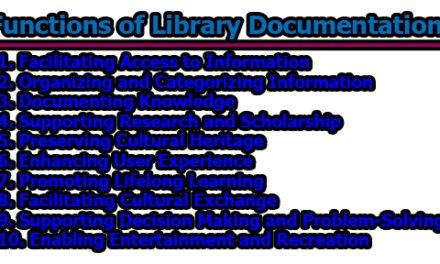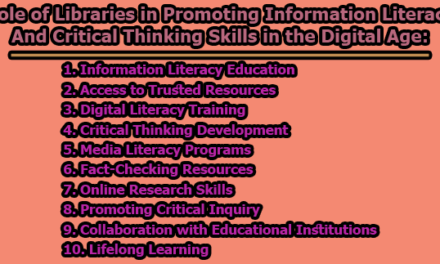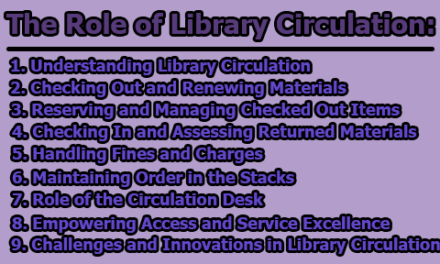Effective Ways to Encourage Professional Development in Your Library Staff:
Professional development is the cornerstone of a thriving library environment. As libraries evolve to meet the changing needs and expectations of their patrons, the role of library staff becomes increasingly complex. To keep pace with this transformation, library staff must continually enhance their skills and knowledge. However, motivating and supporting library staff to pursue professional development can be challenging, especially in the face of limited resources and numerous competing priorities. In this article, we will explore some effective ways to encourage professional development in your library staff, drawing from the principles of adult learning, organizational culture, and recognition.
1. Understand the Needs and Interests of Your Staff: Understanding the needs and interests of your library staff is the foundational step in fostering a culture of professional development. Each member of your team brings unique skills, aspirations, and learning preferences to the table. Recognizing and addressing these individualities is crucial to creating an environment that encourages growth and empowers your staff to excel in their roles. Here’s how you can effectively understand the needs and interests of your library staff:
- Surveys: Surveys are an excellent tool to gather information about your staff’s professional development needs and preferences. Design questionnaires that explore their areas of interest, preferred learning methods, and any specific skills they wish to acquire or improve. Surveys can be anonymous to encourage honest responses.
- Interviews: One-on-one interviews provide a more in-depth understanding of your staff’s goals and interests. It’s an opportunity for open and candid conversations. During these interviews, you can explore their career ambitions and inquire about the type of support they believe they need to achieve these goals.
- Performance Reviews: Performance reviews are not just for assessing past performance; they can also be forward-looking. Use this as a chance to discuss your staff’s future aspirations and their perceived areas for development. This can be a constructive platform for setting personal development goals.
- Self-Assessments: Encourage your staff to conduct self-assessments. This involves them reflecting on their strengths, weaknesses, and areas where they believe professional development is necessary. It can be a valuable tool for self-awareness and setting personalized development plans.
- Short-Term and Long-Term Goals Alignment: Understanding your staff’s short-term and long-term career goals is key. How do they see themselves growing within the organization? Are their aspirations in harmony with the library’s mission and vision? This alignment is crucial for both personal motivation and the library’s long-term success.
By employing these methods, you not only gain insights into your staff’s needs and interests but also demonstrate a commitment to their individual growth. It sends a strong message that their development is a priority, which can boost morale and motivation. Furthermore, it enables you to tailor professional development opportunities, making them more engaging and relevant to each team member. This personalized approach ensures that your library staff is well-equipped to meet both their personal and organizational goals, resulting in a more skilled, engaged, and motivated workforce.
2. Provide a Variety of Learning Options and Resources: Diversifying the learning options and resources available to your library staff is the second critical step in promoting professional development. People have varying preferences and learning styles, and providing a range of choices ensures that each staff member can find a path that best suits their needs. Here’s how you can offer a diverse array of learning opportunities and resources:
Formal Learning Opportunities:
- Courses and Workshops: Organize or facilitate formal courses and workshops on relevant topics. These structured settings are ideal for in-depth knowledge acquisition.
- Certifications: Support staff in obtaining certifications related to their roles. These credentials can be professionally rewarding and enhance their expertise.
- Conferences: Encourage attendance at industry conferences. Conferences provide exposure to the latest trends and networking opportunities.
Informal Learning Avenues:
- Webinars: Host or recommend webinars on subjects of interest. Webinars are convenient for staff to participate in without leaving the library.
- Mentoring and Coaching: Set up mentorship or coaching programs where experienced staff guide their colleagues. This promotes one-on-one learning.
- Peer Learning: Foster an environment where staff members can learn from each other. Peer learning can be highly effective as it’s relatable and based on shared experiences.
- Job Shadowing: Arrange opportunities for staff to shadow colleagues in different roles. This exposes them to different aspects of library operations.
- Self-Directed Learning: Support self-directed learning by providing resources and encouragement for staff to explore topics on their own.
Leveraging Existing Resources:
- Library Resources: Utilize the resources within your own library. Online databases, journals, books, and other materials can be excellent sources of information for self-guided learning.
- Multimedia Resources: Incorporate multimedia resources like podcasts, videos, and blogs. These are engaging and accessible ways to learn.
- Collaboration with Other Libraries: Partner with other libraries, organizations, or networks to share resources and expertise. This collaboration can provide access to a wider range of resources and knowledge.
By offering these diverse learning options, you cater to the varied preferences and needs of your staff. Some may thrive in a structured classroom environment, while others might prefer self-paced online learning. Informal avenues, such as mentoring and job shadowing, provide practical experience and foster a culture of continuous improvement. Collaboration with other institutions broadens the horizons of your staff and brings fresh perspectives into your library. This array of options not only makes learning more accessible but also keeps it engaging and relevant. In doing so, you create a library staff that is adaptable, knowledgeable, and better equipped to meet the evolving demands of your patrons and the industry as a whole.
3. Create a Supportive and Collaborative Learning Environment: Creating a supportive and collaborative learning environment is pivotal to nurturing a culture of continuous learning and improvement within your library. When library staff feel encouraged, supported, and engaged in their development, they are more likely to excel in their roles and drive innovation. Here’s how you can build a conducive learning environment:
Clear and Realistic Expectations:
- Set Clear Learning Objectives: Clearly outline the expectations for professional development. Define learning goals and communicate how these goals align with the library’s mission and objectives.
- Realistic Timelines: Encourage staff to set realistic timelines for achieving their learning objectives. This prevents burnout and ensures sustainable progress.
Feedback and Guidance:
- Regular Feedback: Provide ongoing feedback on staff performance and their progress toward their development goals. Constructive feedback helps staff understand where they excel and where they can improve.
- Mentorship: Establish mentorship programs where experienced staff can guide their colleagues. Mentorship offers personalized guidance and support in navigating professional development.
Acknowledgment of Achievements:
- Recognition: Acknowledge and celebrate staff achievements and milestones. Recognize completed courses, certifications, or any other significant accomplishments with certificates or awards.
- Peer Recognition: Encourage peers to acknowledge and celebrate each other’s achievements. This creates a positive and motivating atmosphere.
Addressing Challenges and Barriers:
- Problem Solving: Be proactive in addressing challenges and barriers to learning. Whether it’s resource limitations or personal obstacles, provide solutions and support.
- Access to Resources: Ensure that staff have access to the resources they need for their development, be it books, online courses, or mentorship opportunities.
Sharing Learning Experiences and Best Practices:
- Regular Sharing Sessions: Organize regular sessions where staff can share their learning experiences and insights. This can include presentations, workshops, or informal discussions.
- Best Practices Repository: Create a repository of best practices that staff can access. This resource can serve as a reference for continuous improvement.
Cross-Functional or Cross-Departmental Learning:
- Interdepartmental Collaboration: Encourage collaboration and knowledge sharing across different departments within the library. This cross-pollination of ideas can lead to innovative solutions.
- Cross-Training: Consider cross-training opportunities where staff can temporarily work in different departments to gain a broader understanding of library operations.
By implementing these strategies, you foster an environment where staff feel empowered and supported in their professional growth. Regular feedback keeps them on the right track, while acknowledgment and recognition inspire them to continue their journey. Addressing challenges demonstrates your commitment to their development and ensures that resources are accessible. Sharing learning experiences and best practices creates a knowledge-sharing culture, where staff learn from each other. Cross-functional or cross-departmental learning not only expands their skills but also encourages a more holistic approach to library services. In sum, a supportive and collaborative learning environment propels your library staff to be more engaged, confident, and satisfied in their roles, which, in turn, benefits the library and its patrons.
4. Align Professional Development with Organizational Goals and Strategies: Aligning professional development with your library’s organizational goals and strategies is a crucial step to ensure that the growth of your staff is not only meaningful to them but also advances the library’s mission and vision. Here’s how you can effectively integrate professional development into the broader library strategy:
Communication of Alignment:
- Library’s Vision and Mission: Clearly communicate the library’s vision and mission to your staff. Help them understand how their professional development contributes to the realization of these core values.
- Strategic Plans: Highlight the specific goals and strategies outlined in the library’s strategic plans. Explain how staff development is a key component in achieving these objectives.
- Annual Plans and Budget: Link professional development to the library’s annual plans and budget. This demonstrates the allocation of resources and commitment to staff growth.
Explicit Connections:
- Alignment with Objectives: Ensure that professional development activities are directly connected to the library’s objectives and priorities. When staff see a direct link between their learning and the library’s success, they are more likely to be motivated.
- KPIs and Metrics: Define key performance indicators (KPIs) or metrics that can measure the impact of professional development on the library’s performance. This quantifiable data helps to showcase the value of staff development.
Involvement of Staff:
- Participation in Planning: Involve staff in the planning process of professional development. Solicit their input on which skills and knowledge areas they believe are most relevant to achieving library goals.
- Feedback and Evaluation: After professional development activities, gather feedback from staff to evaluate the effectiveness of the program. What worked well, what didn’t, and what could be improved? Use this feedback to refine future initiatives.
Integration of Development into Roles:
- Performance Appraisal: Include staff’s engagement in professional development as part of their performance appraisal. Encourage staff to set professional development goals aligned with their roles.
- Career Progression: Outline how professional development can contribute to career progression within the library. Staff should see how their growth leads to more significant responsibilities and opportunities.
Regular Updates:
- Communication: Keep staff informed about the progress of the library in achieving its strategic goals and how their development efforts contribute to these accomplishments. Regular updates can maintain their motivation.
By making these explicit connections between professional development and your library’s broader goals, you not only motivate your staff but also establish a culture where individual growth is synonymous with organizational success. It fosters a sense of shared purpose and accountability, where staff understand that their development is an integral part of the library’s mission. Involving staff in the planning and evaluation process empowers them and reinforces their ownership of their own learning journey. Ultimately, this alignment ensures that professional development is not an isolated activity but a strategic investment in the library’s long-term success.
5. Recognize and Reward Professional Development Efforts and Outcomes: Recognizing and rewarding professional development efforts and outcomes is a vital component in maintaining staff motivation and encouraging a culture of continuous learning within your library. By acknowledging and celebrating achievements, you not only motivate your staff but also showcase the value of professional development. Here are some effective ways to recognize and reward professional development:
Formal Recognition:
- Certificates and Badges: Award certificates or badges to staff upon the completion of courses, certifications, or significant training programs. These physical symbols serve as tangible evidence of their achievements.
- Awards: Institute awards to honor outstanding contributions in professional development. This could include categories such as “Most Improved,” “Innovator of the Year,” or “Professional Development Champion.”
- Letters of Appreciation: Personalized letters or emails from library leadership expressing gratitude for their commitment to professional growth can be a meaningful form of recognition.
Informal Recognition:
- Announcements: Recognize staff accomplishments through internal communication channels, such as newsletters, bulletin boards, or staff meetings. Public acknowledgment highlights their achievements and motivates others.
- Peer Acknowledgment: Encourage staff to acknowledge and celebrate each other’s achievements. Peer recognition creates a positive and motivating atmosphere within the team.
Tangible Rewards:
- Financial Incentives: Consider offering financial incentives or bonuses for staff who achieve certain milestones in their professional development. This can be a powerful motivator.
- Career Advancement: Promote career advancement opportunities for staff who have demonstrated significant growth. This could include promotions, raises, or access to higher-level roles.
- Flexible Work Arrangements: Offer flexible work arrangements, such as remote work options or adjusted schedules, as a reward for successful professional development. This can enhance work-life balance and job satisfaction.
- Additional Learning Opportunities: Provide access to further learning opportunities, such as advanced courses, specialized training, or attendance at conferences, as a reward for continued development.
Showcasing Success Stories:
- Staff Testimonials: Encourage staff who have benefited from professional development to share their success stories. These testimonials can inspire and motivate others to embark on their own learning journeys.
- Illustrate Impact: Demonstrate how staff members have applied their newfound knowledge to improve their performance, enhance library services, or drive innovation. Concrete examples of positive outcomes reinforce the value of development.
By implementing these recognition and reward mechanisms, you create a culture where professional development is not just an individual endeavor but a celebrated and encouraged part of the organization. Staff members are motivated to pursue growth, and their achievements are celebrated, inspiring others to follow suit. Moreover, these efforts contribute to a positive work environment, increased job satisfaction, and higher levels of staff engagement, all of which benefit the library and its patrons. Recognizing and rewarding professional development is a win-win for both library staff and the library itself.
6. Model and Advocate for Professional Development: Modeling and advocating for professional development is one of the most powerful ways for library leaders to inspire and empower their staff to pursue continuous learning. As a library leader, your actions and words can set the tone for a culture of growth and development within your organization. Here’s how you can effectively model and advocate for professional development:
Lead by Example:
- Personal Professional Development: Actively engage in your own professional development activities. Attend workshops, conferences, and training sessions relevant to your role as a leader in the library.
- Share Experiences: Share your own learning experiences and outcomes with your staff. Discuss how your growth has benefited your work and contributed to your effectiveness as a leader.
Advocate for Resources:
- Resource Allocation: Advocate for the allocation of resources within the library budget for professional development initiatives. Secure funding for staff to access courses, workshops, and other learning opportunities.
- Access to Learning Materials: Ensure that your library provides access to learning materials, such as books, online resources, and subscriptions, to support staff’s self-directed learning.
Raise Awareness:
- Communication: Regularly communicate the importance of professional development to your staff. Explain how it aligns with the library’s goals, enhances service quality, and benefits the community.
- Promote Success Stories: Share success stories of staff members who have benefited from professional development. Highlight their achievements and how these have positively impacted the library.
Engage in Mentorship:
- Mentorship and Guidance: Offer mentorship and guidance to your staff regarding their professional development goals. This personal involvement can motivate and guide them effectively.
Involve Staff in Decision-Making:
- Staff Input: Encourage staff to provide input on the types of professional development opportunities they would like to see implemented. Include their perspectives in decision-making processes.
Community Advocacy:
- External Advocacy: Advocate for professional development within the larger library and educational community. Participate in discussions, conferences, and associations to promote the importance of lifelong learning.
Celebrate Achievements:
- Public Acknowledgment: Celebrate staff achievements in a public and visible manner. Recognize those who have excelled in their development efforts with awards, certificates, or other forms of acknowledgment.
Continuous Learning Culture:
- Promote a Culture of Learning: Emphasize that learning is a continuous process and that it is valued within the library’s culture. Encourage staff to embrace a growth mindset.
By modeling and advocating for professional development, library leaders not only motivate their staff but also contribute to the long-term success of the organization. Staff members are more likely to prioritize their own growth when they see their leaders actively engaged in learning and development. Additionally, a library that invests in professional development builds a more skilled, adaptable, and innovative workforce that can better meet the evolving needs of the community it serves. In this way, your leadership serves as a catalyst for growth and improvement within the library and the broader library community.
In conclusion, encouraging professional development among your library staff is a multifaceted process that involves understanding their needs and interests, offering a diverse range of learning opportunities, creating a supportive and collaborative learning environment, aligning development with organizational goals, recognizing and rewarding efforts, and modeling and advocating for professional development as a leader. By implementing these strategies, libraries can ensure their staff remains well-equipped to meet the ever-evolving needs of their patrons and the community. Ultimately, investing in professional development is an investment in the future of your library.

Library Lecturer at Nurul Amin Degree College










